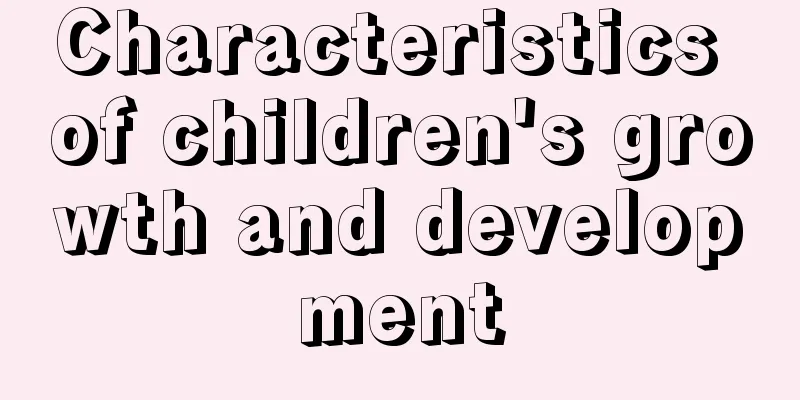What are the symptoms of anorexia in infants?

|
The baby's body is in the development stage and needs to take in various nutrients. Most babies have anorexia period, which is usually caused by many reasons. The baby's anorexia may be caused by physiological factors, or it may be caused by improper parental education and other reasons. The cause of baby's anorexia must be found and then dealt with in time according to the cause. What are the symptoms of baby anorexia? Let’s take a look at it next. 1. Infant anorexia Infant anorexia refers to a decrease or loss of an infant's appetite. There are mainly two pathophysiological factors: one is that local or systemic diseases affect the digestive function, causing low gastrointestinal smooth muscle tension, reduced digestive juice secretion, and reduced enzyme activity; the other is that the central nervous system is affected by stimulation from the internal and external environment of the human body, causing the regulation of digestive function to lose balance. 2. Causes of anorexia in infants There are many reasons for anorexia. In addition to some pathological factors, improper diet and improper parenting are also one of the reasons for anorexia in infants. 1. Pathological factors: Some infants are weak and sickly, often suffer from gastrointestinal discomfort, upper respiratory tract infection, repeated fever and even pneumonia, which can cause loss of appetite in infants. Weak infants have slow intestinal motility and a longer gastric emptying time, which leads to a loss of appetite. Nutritional anemia, rickets, chronic digestive tract diseases, hepatitis, etc. can all cause anorexia. In addition, the lack of B vitamins and trace element zinc can cause a decrease in the baby's taste function and gastric mucosal digestive function, causing the baby to have no appetite and weakened digestive ability. 2. Improper diet ① Add complementary food too late. During the critical period of adding complementary foods to babies, if the baby is not given appropriate exercise, the baby's chewing ability will lag behind that of children of the same age. Now we are in a hurry to add complementary food, which makes the baby unable to adapt for a while. ② Excessive intake of sweets. Two-year-old babies like to eat sweets. If parents do not control them, the babies will eat too much high-sugar food, which will cause the blood sugar content in the blood to increase. After the blood sugar level increases, it will stimulate the brain, making the brain's feeding center feel full, not wanting to eat, and then causing anorexia. ③The baby is picky about food, or eats too many snacks before meals. Or when adding weaning food to the baby, you let the baby eat more of the food he likes, causing him to get bored; or you force the baby to eat when he doesn't want to, causing the baby to rebel. 3. Improper parenting ① Over-indulgence. Some parents indulge their children too much. At the dinner table, they keep nagging their children to eat more and stuffing large amounts of fish, meat, shrimps, crabs, etc. into their children's mouths, which makes the children feel disgusted. These children also often use refusing to eat as a means of threatening their parents, and because their parents indulge them in every way, they artificially cause their children to suffer from anorexia. ②The parent-child relationship is tense. Some parents often experience tension in their child-child relationship because their children refuse to eat. When mothers see their children looking around absent-mindedly and taking a long time to swallow a mouthful of food while eating, they often threaten them: If you don’t eat, I don’t like you. If you don't eat anymore, I won't want you anymore. As a result, children will experience great fear and tension psychologically, which will create great pressure and make it impossible for them to feel the joy of eating, and they will develop a dislike for eating. ③Irregular life. According to a survey, children with anorexia generally have an irregular life, and anorexia is positively correlated with irregular life. ④Inappropriate amount of activity. In a baby's daily life, too much or too little activity will affect the baby's appetite and food intake. Some babies have a quiet personality, preferring to stay still than to move, and their activity volume is too small and the content of their activities is monotonous, which affects their digestion and absorption functions; some babies have an active personality, and their activity volume is too large and the activity time is too long, and excessive fatigue will also affect the baby's food intake and appetite. 4. Mental factors: Anorexia caused by mental factors is called anorexia nervosa, which is quite common among young children. Bad eating habits will gradually reduce the excitability of children's food centers and cause anorexia nervosa in children. 5. Other factors: The summer heat makes babies suffer; they are too excited and overactive, etc. 3. Confusion-inducing symptoms of anorexia in infants Summer anorexia: refers to the child's loss of appetite and poor appetite, and even does not want to eat the normal meals he usually likes, but the child's internal organs do not have any abnormal lesions. Common causes of anorexia mainly include psychological factors and bad eating habits. Anorexia is related to nutrient deficiencies. For example, when vitamin B1 is deficient, intestinal motility decreases and appetite decreases. Anorexia nervosa: also known as anorexia nervosa, or anorexia for short, is a psychological and physiological disorder in which the patient intentionally causes a significant drop in weight to below the normal physiological standard weight and tries hard to maintain this state. Alternating bulimia and anorexia: Bulimia and anorexia are eating disorders that are extremely harmful to physical health. It is not enough for patients with this disease to receive only drug treatment, they also need to receive psychological treatment. Cycles of spontaneous food refusal and binge eating and vomiting (in and out) can have serious physiological effects. Physiological anorexia: This is a condition in which the baby refuses to eat milk when he is 3 to 4 months old. The baby's temporary aversion to milk is called the physiological anorexia period. Clinical manifestations: The infant has no appetite for a long time, is not greedy for food, or even refuses to eat. 4. Prevention and relief of infant anorexia 1. Scientific feeding, timely weaning, and timely addition of complementary foods will enable the baby to smoothly complete the transition from sucking to chewing, and from eating liquid to solid food, so as to promote the development of taste and digestive function. 2. Understand children’s eating psychology and carry out correct psychological guidance. ① Let it be. If a child has a poor appetite, it does not matter if he or she skips a meal. On the contrary, it gives the tired digestive system a chance to rest. Most children will naturally have an appetite when they are hungry. ②Induce appetite. Frequently change the variety and color of food. Food with good color, aroma, taste and shape can excite the feeding center and stimulate appetite. When a baby first comes into contact with a certain food, parents can give the food appropriate evaluation, and the correct evaluation of adults can play a guiding role. ③Keep a happy mood before eating. Before meals, let your children look at interesting pictures, listen to funny jokes, and play games to maintain a happy mood, increase the excitability of the feeding center, increase the secretion of gastrointestinal digestive juices, and enhance intestinal peristalsis to promote appetite. ④ Arrange your work and rest time reasonably. You should eat at regular times and avoid eating without restraint; go to bed early at night to ensure adequate sleep. Carry out appropriate activities to promote metabolism and speed up the digestion and absorption of food. However, the amount of activity should not be too much, especially you should not play too happily before meals, so as not to be overly tired or unable to calm down and affect your appetite. 3. Cultivate good eating habits for young children. ①Prepare before meals. The table should be cleaned and disinfected before each meal. Babies must wash their hands before meals, and wipe and rinse their mouths after meals (they should also rinse their mouths after snacks and wash their hands after eating fruit). Educate your baby not to engage in strenuous activities before meals and not to drink water half an hour before meals. ② Eat on time. Three meals a day should be eaten on time, and each meal should last about half an hour. Let your child finish his or her meal quietly and cultivate the habit of chewing slowly. In addition, it is important to cultivate the habit of the baby to eat by himself. Generally speaking, a baby can use a spoon to eat at the age of one and a half years old. A two-year-old baby can practice using a spoon to eat by himself, and then gradually let them learn to use chopsticks and other eating utensils. ③Fixed point and quantitative. There should be a fixed place for each meal. Each meal should be provided according to the baby's needs, with attention to comprehensive nutrition and variety. Breakfast should be mainly staple food, with side dishes as secondary, and a combination of dry and liquid, sweet and salty; lunch and dinner should pay equal attention to staple food and side dishes, with one meat, one vegetable and one soup. Be careful not to let babies soak rice in soup. Do not let your baby eat excessively during holidays to avoid hurting the baby's gastrointestinal tract and causing indigestion. ④Serve less and add more. Adults should not serve too much rice or too full a bowl, nor should they put all the dishes into the baby's bowl at once. It is best to add more food after the baby has finished eating, and give timely praise to make the baby eat happily. ⑤ Cultivate good habits for babies not to be picky about food. When arranging meals for babies, pay attention to the combination of coarse grains, fine grains, and meat and vegetables. If a baby doesn't like to eat a certain food, adults can gradually correct it by using a strategy of starting from less to more. Be careful not to talk about your likes and dislikes of certain foods in front of your baby, so as to avoid direct influence on the baby. For babies who have poor appetite, are picky eaters, or refuse to eat, we should not criticize or blame them during meals to avoid further affecting their appetite. If you are simply picky about food, you can add some twists to the cooking process and pay attention to the color, aroma, taste and shape of the dishes. For babies who don’t like to eat fat and vegetables, you can chop the fat and vegetables into meat sauce, wrap it in dumplings and feed it to the baby. To address babies’ bad habit of being picky eaters, you can also introduce the characteristics and nutritional value of various dishes through storytelling and reciting nursery rhymes. |
<<: What should I do if my child has a fever of 37.5 degrees?
>>: What should I do if my child has a fever but his hands and feet are cold and his body is hot?
Recommend
Height and weight standard for three-year-old boy
I don’t know if you know about the standard heigh...
Reasons for baby diarrhea in summer
Every change in the baby after birth is watched b...
Why does my baby have dry cough in summer?
The weather is relatively hot in summer, especial...
Age when deciduous teeth come out
Babies usually have no teeth after they are born,...
Nine-month-old baby development standard indicators
Ten months of pregnancy and one day of delivery e...
Can children's growing pains be relieved by soaking their feet more often?
Growing pains can be said to be a problem that ch...
How to treat bedwetting
The problem of bedwetting is quite common in life...
How to change infant formula
Nowadays, milk powder seems to have become a must...
What to do if your baby has a hole in the heart
The heart is a very important organ in the human ...
Five-month-old baby's growth and development standards
The birth of a new baby is something every family...
Can Iodine be used on baby wounds?
Injuries not only happen to adults, but babies ha...
What foods can cause precocious puberty?
With the continuous improvement of economic condi...
How to improve the appetite of children who don't eat
When children are growing, if their diet does not...
Intellectual development of 30-month-old baby
The intelligence of a thirty-month-old baby has b...
The fastest way to treat cough in babies
Nowadays, the incidence of severe cough in babies...









